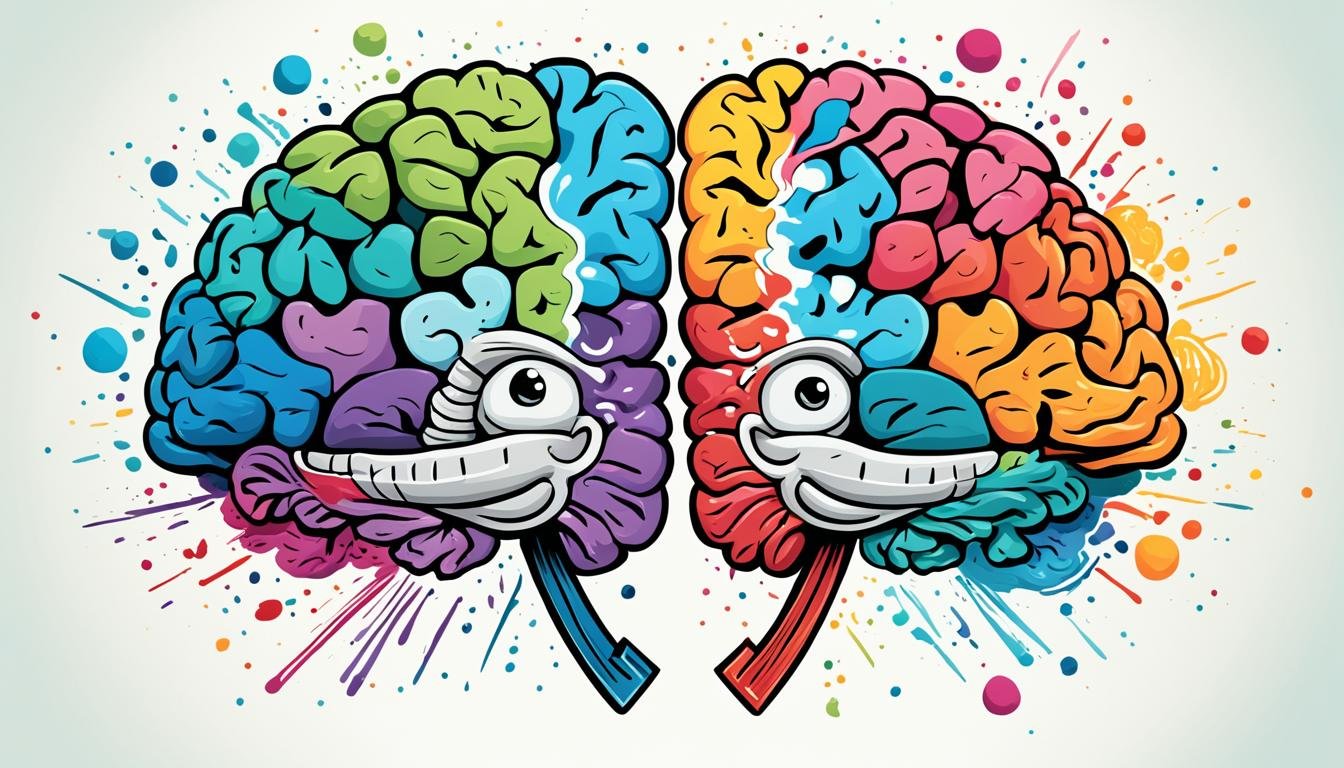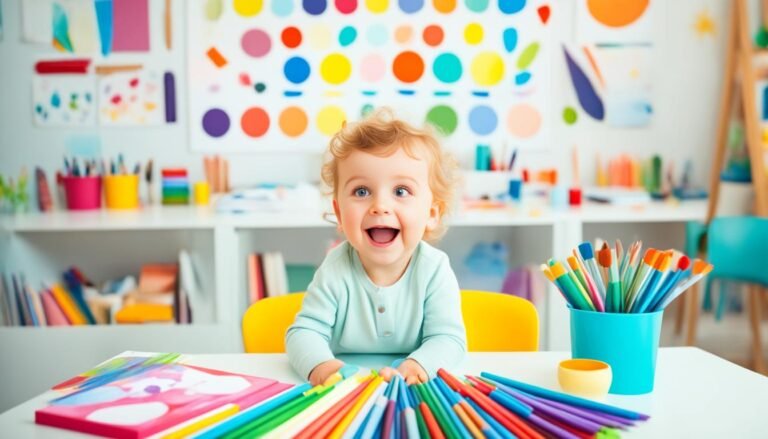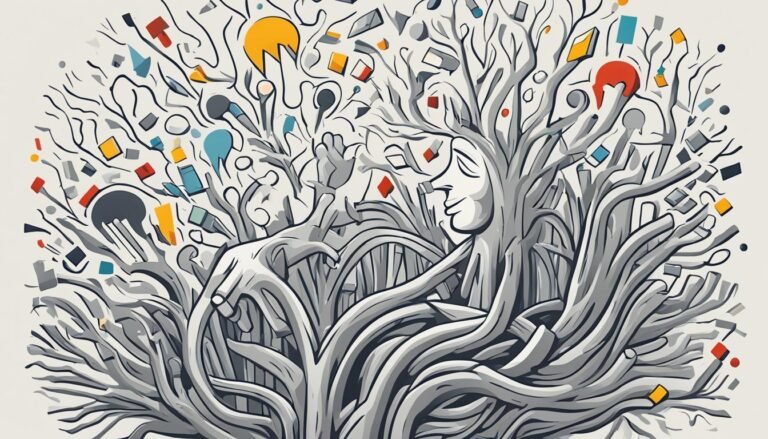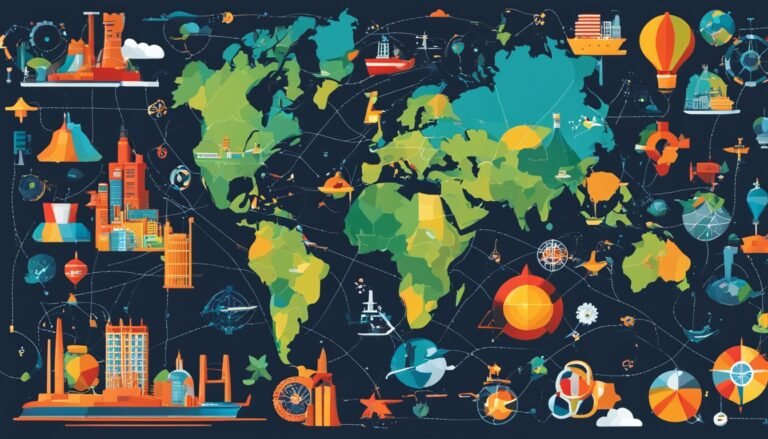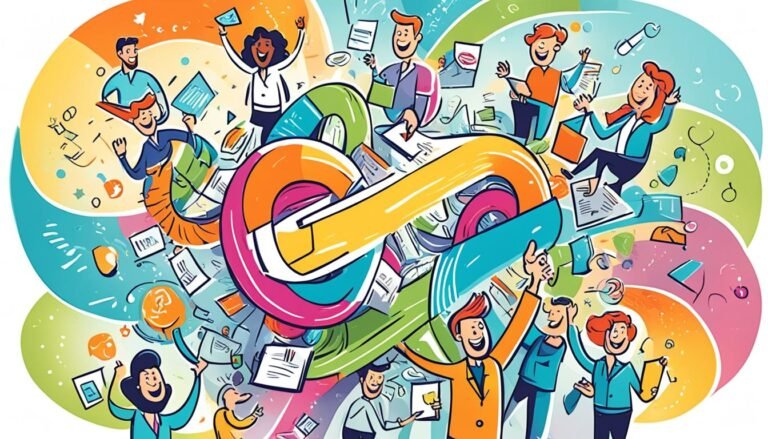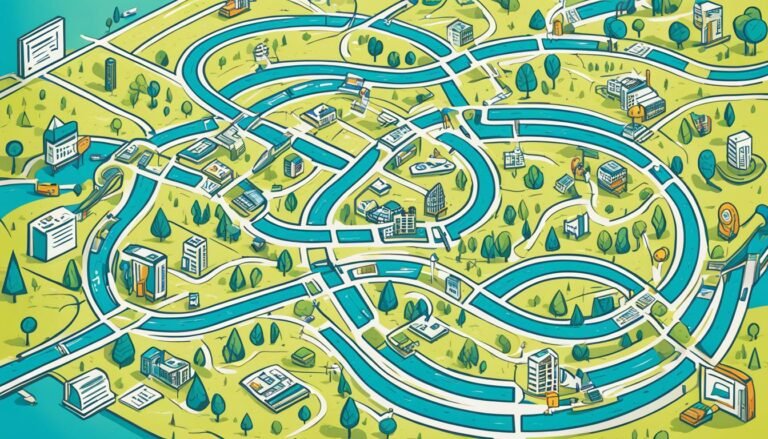The Link Between Emotional Intelligence and Creativity
Emotional intelligence and creativity work closely together. They are essential for solving problems and creating new things. Emotional intelligence plays a big role in how creatively we think. When we understand emotions, it helps us think of fresh ideas.
Key Takeaways:
- Emotional intelligence and creativity are interrelated forces that fuel problem-solving and innovation.
- Early theories by Freud and Maslow suggest that emotions play a crucial role in the creative process.
- Emotional intelligence empowers individuals to regulate emotions effectively, tap into authentic experiences, and foster a conducive environment for creativity.
- High emotional intelligence enhances creative problem-solving by promoting holistic thinking, empathy, and adaptability.
- Emotionally intelligent individuals excel in collaborative efforts, facilitating effective communication, empathy, and conflict resolution.
The Historical Perspective: Emotion and Creativity
Early thinkers like Freud and Maslow found a big link between feeling and making things. They showed how knowing your feelings helps you make cool stuff.
“Inner conflicts can be turned into creativity,” Freud said. This helps deal with big feels.
Maslow said creating means being your true self. It lets you show who you really are inside.”
Looking back, we see how feeling and creating always walked hand in hand. This tells us emotions have been big players in making new things for a long time.
Understanding and using our emotions can really boost our creativity. When we get good at handling how we feel, we can make better art. We also solve problems in new and clever ways.
So, now let’s see how our feelings help in creating new stuff. We’ll talk about how being smart about our feelings makes us do smarter, cooler creative things.
| Benefits of Emotional Intelligence for Creativity |
|---|
| 1. Enhanced self-expression and authenticity | 2. Improved problem-solving and innovation | 3. Effective regulation of overwhelming emotions |
| 4. Facilitated creative collaboration and teamwork |
| 5. Adaptability in different creative contexts |
The Role of Emotion in Creative Process
Emotions are key in sparking creativity. They both motivate us and hold us back. Top creators and thinkers highlight how emotions drive the making of new, amazing ideas. Whether you’re a painter or a writer, emotions matter a lot in creating something unique.
When it comes to being creative, lots of emotional gears turn into place. It can vary from having an eye for beauty in numbers to how different people feel and show their emotions. All these feelings and ways of expressing them shape how we tackle creative tasks.
Getting a hold of your feelings is important for being more creative. It lets you set a good vibe for making something new. By focusing on knowing yourself better, understanding others, and managing how you feel, you can find true gems of ideas in your creativity.
“Emotions are the fuel that propels the creative engine, transforming raw ideas into works of art.”
Having emotional smarts changes the game in creativity. It helps you steer through your feelings and use them wisely to express your creativity. This way, you can explore a wide set of thoughts and feelings. This helps you make your work richer and more meaningful to others.
So, emotions are a big part of making something new. Learning to control your emotions helps a lot. It allows you to use how you really feel for your creative projects. This makes the space around you just right for big, new ideas. Understanding and working with your feelings can truly bring out amazing creativity in anyone.
Emotional Intelligence and Creative Problem-Solving
Emotional intelligence and creativity go hand in hand. They allow for unique ways to solve problems. Those with high emotional intelligence spot, deal with, and understand emotions. This helps them come up with new and creative solutions.
Empathy is key in creative problem-solving. It allows us to see through others’ eyes. This deepens our understanding and helps find new, out-of-the-box solutions. By understanding many viewpoints, emotional intelligent people can think different and find new ideas.
“Emotional intelligence allows us to connect with others on a deeper level, unlocking the potential for collaborative problem-solving and generating creative solutions.”
Self-awareness, a big part of emotional intelligence, is very important. It lets people know what they’re good at and not so good at. This helps lay the groundwork for creativity. Knowing our own emotions and their impact helps us adjust how we solve problems. This lets us use our creative power better.
Being creative often means working in a team and talking effectively. Emotional intelligence makes teamwork smoother by improving how we listen, solve conflicts, and connect with others. With strong emotional skills, we can work well in teams and make a space where lots of ideas can grow. A team working this way can come up with solutions that are both new and wide-ranging.
Emotional Intelligence and Adaptability
Adaptability is also closely linked to emotional intelligence. Creative problem-solving often needs us to be flexible and change our plans as needed. Emotional intelligence helps us control our feelings. This keeps us focused and ready to adapt, even when things get hard.
People high in emotional intelligence bounce back well from setbacks, which is important in solving problems creatively. They see obstacles as chances to learn and grow. By staying positive and open-minded, they can look at problems in new ways. This leads to finding solutions that others might not see.
The Impact of Emotional Intelligence on Creative Problem-Solving
Studies show that those with more emotional intelligence do better in solving problems creatively. Their skills in empathy, self-awareness, and adaptability let them see problems from many angles. This helps them think deeply and create solutions for complex issues.
| Key Benefits of Emotional Intelligence for Creative Problem-Solving |
|---|
| Enhanced empathy and understanding of multiple perspectives |
| Improved self-awareness, leading to more innovative ideas |
| Effective collaboration and communication with team members |
| Greater adaptability and resilience in the face of obstacles |
Developing emotional intelligence helps us be more creative in solving problems. Emotional intelligence and creative solution-finding support each other. They help us face challenges, make new solutions, and reach impressive goals.
Emotional Intelligence and Collaboration
Working together boosts creativity and innovation. Emotional intelligence makes a big difference in how we work as a team. People with high emotional intelligence understand and handle team emotions well. This creates a positive atmosphere that boosts creative thinking.
The Power of Emotional Intelligence in Collaboration
People with emotional intelligence are great at talking, showing empathy, and solving problems. These are key for teamwork. They help team members connect better, trust each other more, and get past any problems in working together.
“Emotional intelligence allows individuals to navigate the complexities of human emotions, particularly within group settings, to create a harmonious and conducive environment for collaboration.” – Dr. Maria Johnson, Emotional Intelligence Researcher
Emotional intelligence supports being open to different opinions in teamwork. It helps in finding truly new and creative solutions. Emotionally intelligent people welcome diverse views and use them in team decisions. This leads to a mix of insights and ideas in the outcomes.
The Impact of Emotional Intelligence on Team Creativity
Emotional intelligence boosts a team’s creative power. It makes brainstorming better, feedback more helpful, and opens doors to new ideas. It allows everyone to share their thoughts and feelings freely. This creates synergy, which keeps the creative process going strong.
People who are emotionally intelligent bring key skills to a team:
- Active listening: Truly understanding others’ points of view
- Empathy: Feeling what your team members feel
- Conflict resolution: Solving issues to keep collaboration peaceful
- Adaptability: Being ready to face new challenges
All these skills help make a team more creative through emotional intelligence.
Emotional Intelligence and Collaboration
| Benefits of Emotional Intelligence in Collaboration | Enhanced Creativity through Emotional Intelligence |
|---|---|
| Promotes effective communication and constructive feedback exchange | Encourages diverse perspectives, leading to innovative solutions |
| Fosters trust and psychological safety within the team | Creates a supportive environment that stimulates creativity |
| Facilitates conflict resolution and prevents interpersonal clashes | Allows for the smooth navigation of creative challenges and setbacks |
To sum up, emotional intelligence is vital for teamwork. It makes communication, empathy, and problem-solving better. Teams using emotional intelligence create an inviting atmosphere that boosts creativity. It shows us how powerful working together can be.
Emotional Intelligence and Contextual Factors
Contextual factors are key in creativity. They shape how we create. Knowing and adapting to different contexts boosts how we innovate and make a difference. Emotional intelligence helps with this by focusing on how we understand and control our feelings. It’s a big part of dealing well with different situations.
Emotional intelligence gives us the skills to read and react to feelings in different places. It works in a job, with friends, or when making art. This skill lets us see a situation’s emotional side and change our creative thoughts to fit.
“Emotional intelligence is the ability to recognize and understand your own emotions and the emotions of others, and to use this understanding to inform your thoughts and actions.”
People who are emotionally smart can handle complex social scenes. They can set the right expectations and change their creative plans to fit the context. By knowing how they and others feel, they create work that really connects with people or gets the result they want.
Think of an ad campaign for a new luxury brand. A team with high emotional intelligence would get what the target audience wants. They’d know what would catch their eye emotionally. Their ad would talk directly to those feelings.
Also, emotional intelligence is great for teams. It makes working together smoother by boosting understanding, kindness, and clear talking. Managing and picking up on emotions helps build a good team vibe where everyone’s creativity shines together.
So, being emotionally smart in creativity helps us succeed in different spots. It uses our feelings to make work that’s both powerful and touching.
The Role of Emotional Intelligence in Different Contexts
Being emotionally smart shows up in various places and ways. Here’s how it’s linked to creativity in different scenes:
- Workplace: It helps navigate work politics, stress, and boosts group creativity. It makes talking, fixing fights, and working together better.
- Social Interactions: It helps connect with others on a deep level. Understand their needs and dreams. This makes your creative work hit home emotionally.
- Artistic Endeavors: For artists and makers, it means showing real feelings in their work. This makes their creations echo with others’ emotions.
Developing Emotional Intelligence for Contextual Creativity
Getting better at emotional intelligence involves looking inside, caring about others, and practicing. Here’s how to sharpen your emotional intelligence for creativity:
- Self-awareness and Reflection: Think about your feelings and how they shape your creative work. Know your strengths and what to improve on with feelings.
- Empathy and Perspective-taking: Try to understand how others feel and see things. This helps you make work that gets to different audiences and adjusts to any scene.
- Effective Communication: Improve how you talk about your feelings and get others’ feelings. This makes working with teams better and more creative.
- Practice Emotional Regulation: Learn ways to control your feelings. This keeps you focused, strong, and open when dealing with hard stuff.
Growing your emotional intelligence lets you be more creative in any context. It helps you adjust your ideas to fit the scene, making a real mark with your creativity.
| Context | Role of Emotional Intelligence |
|---|---|
| Workplace | Facilitating effective communication, collaboration, and problem-solving |
| Social Interactions | Establishing genuine connections, understanding emotional needs, and resonating with others |
| Artistic Endeavors | Infusing authentic emotions into creative work, resonating with audiences on an emotional level |
Emotional Intelligence and Creative Output
Emotional intelligence is key to creating unique and original art. People with high emotional intelligence can explore their feelings deeply. This leads to emotional creativity. It helps in making new, touching art, music, and literature.
It allows artists to use their emotions in their work. They understand their feelings well, adding true meaning to their creations. This makes their art resonate with the audience.
Emotional intelligence also helps in problem-solving and coming up with new ideas. Artists who are emotionally smart can think in creative ways. They can, therefore, find new solutions to problems.
In short, emotional intelligence boosts creative thinking. It drives people to innovate in their art. Its impact on their work is massive, affecting both the process and the outcome.
The Impact of Emotional Intelligence on Creative Output
“Emotional intelligence is crucial for my art. It lets me work from deep within and touch others profoundly.” – Sarah Thompson, Visual Artist
Emotional Intelligence in Education and Curricula
Adding emotional intelligence to teaching is important for boosting creativity. It’s key for helping students think creatively. When EQ is part of lessons, it helps build self-awareness, understanding, and control over feelings.
This leads to better creativity and problem-solving among students.
Developing Emotional Intelligence for Creative Expression
Dr. Marie Thompson says building emotional intelligence is crucial for students to be creative. It helps them control their feelings and express themselves honestly.
“When students know how they feel and understand others, they can be more creative and work better with others. Emotional intelligence helps them face challenges in creating, handle creative blocks, and bond with others.”
Teaching EQ in school lets students learn how to manage their emotions. They also learn to be more empathetic and communicate well. These skills are very important for being creative.
The Role of Emotional Intelligence in Problem-Solving
Studies show that emotional intelligence is vital for solving problems in a creative way. Dr. Lisa Chang found that students with high EQ can think flexibly and come up with new ideas.
By teaching emotional intelligence, schools can help students think in different ways. This is useful for finding new solutions to problems.
The Benefits of Emotional Intelligence in Collaborative Settings
In teamwork, emotional intelligence helps a lot. It lets students understand each other better and share their thoughts clearly. This makes team work better and more creative.
“Emotional intelligence makes it easy for students to see things from different views and talk openly. This leads to new ideas and creative solutions.” says Dr. Sarah Adams.
The Integration of Emotional Intelligence into Educational Frameworks
Schools can add emotional intelligence to lessons by teaching it directly. They can also create chances for students to use these skills. Making a welcoming place for learning also helps.
This approach involves social-emotional learning programs. It also includes EQ in different subjects. Creating a class that supports creativity shows students that being creative is important.
The Impact of Emotional Intelligence on Creative Industries
Today, creative jobs are quick and competitive. Emotional intelligence is key for success and new ideas. Designers, advertisers, and entertainers use it to connect with people, share ideas, and deal with the ups and downs of their work.
It helps creative workers understand what their audience wants. They use this understanding to make things that really touch people’s hearts. Having empathy and being aware of how others feel lets them create work that inspires. This boosts audience interest and helps brands succeed.
Enhancing Collaboration and Innovation
In creative fields, many professionals join forces to turn ideas into reality. Emotional intelligence is vital, encouraging honesty, empathy, and solving team problems smoothly. This leads to a work setting that fosters creativity, welcomes different ideas, and encourages new ways of thinking.
It also spurs innovation. Creative minds are encouraged to try new things and not fear making mistakes. They learn from errors, take chances, and adjust when needed. This attitude, combined with emotional intelligence, helps creative teams make amazing, original work.
Navigating the Dynamic Nature of Creative Work
Creative fields always evolve, with new trends and tech popping up, and people’s tastes changing. Emotional intelligence helps professionals stay flexible and resilient. They can face tough times, deal with tough feedback, and keep their creative vision strong.
It also teaches them to use feedback wisely, taking in both the good and the bad. They understand how feedback makes them feel and learn from it. This spurs their growth, improves their work, and leads to exceptional creativity.
In summary, emotional intelligence is vital in the creative world. It helps professionals connect with others, work well in teams, come up with new ideas, and handle the challenges of their job. By sharpening their emotional skills, creative individuals can achieve their full creative potential and greatly impact their fields.
The Link Between Emotional Intelligence and Personal Creativity
Emotional intelligence is key in boosting personal creativity. People with high emotional intelligence show qualities that help in their creative work. These include knowing themselves well, bouncing back from tough times, and being ready to try new things.
Being emotionally smart helps creative folks handle their ups and downs better. This means managing how they feel. It can help them get over doubts and blocks that might slow down their creative ideas.
Working on emotional intelligence makes a better environment inside for creative juices to flow. It’s about controlling feelings so that creative minds have a happy space. A balanced emotional state brings clarity and focus to creative projects. This is what leads to being happier from doing such work and making things that really matter.
Here is a quote that underlines the significance of emotional intelligence in personal creativity:
“Emotional intelligence provides the foundation for self-expression and authenticity in personal creativity. It empowers individuals to embrace their emotions, which serve as a wellspring of inspiration and originality.”
Strong emotions lead the way in creating. Emotional intelligence helps in using these emotions well. This way, people can boost their creativity, grow personally, and make their art shine.
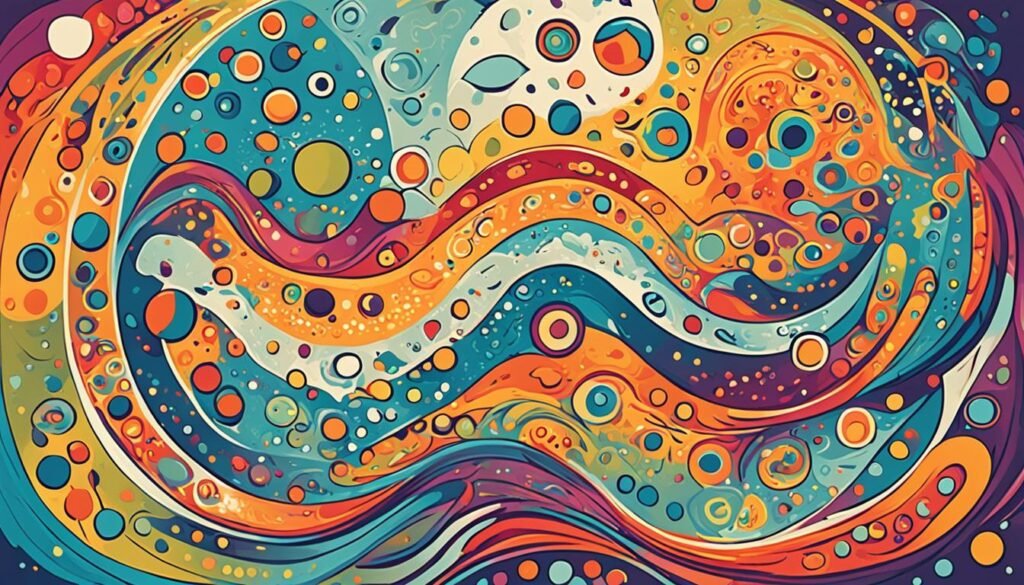
| Benefits of Emotional Intelligence for Personal Creativity |
|---|
| 1. Increased self-awareness and understanding of personal emotions |
| 2. Enhanced resilience and ability to overcome creative blocks |
| 3. Improved ability to manage and regulate emotions during the creative process |
| 4. Greater openness to new experiences and ideas |
| 5. Creation of a supportive inner environment conducive to creative expression |
Conclusion
The tie between emotional intelligence and creativity is strong. We’ve seen how closely they are linked through history, the creative process, problem-solving, and more. Emotional intelligence is key in boosting our creative skills.
Emotional intelligence helps us control our feelings and read others’ emotions. It lets us work well in teams and adapt to any situation. These skills are vital for solving problems in a new way, by seeing things from different viewpoints.
When we improve our emotional intelligence, we open the door to more creativity and fresh ideas. It’s helpful in personal areas, in school, or at work. This skill lets us handle the challenges of creating, share our ideas well, and change with our projects. By using emotional intelligence, we make our minds more open to new thoughts, and we learn to deal with our feelings in a positive way. This all supports our creativity to grow.

